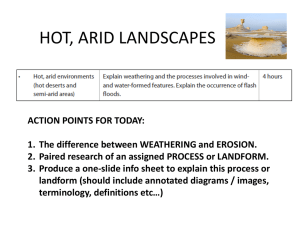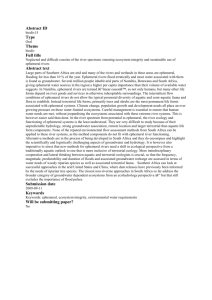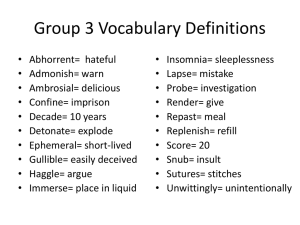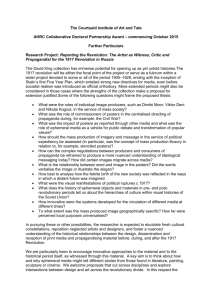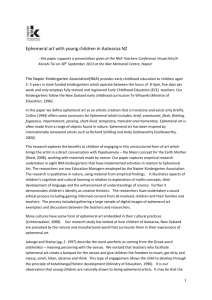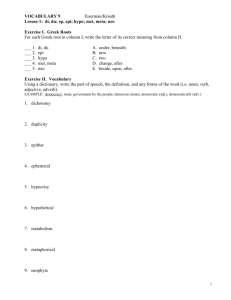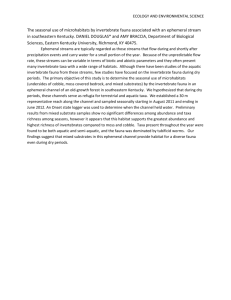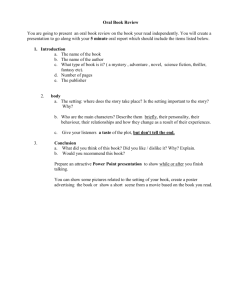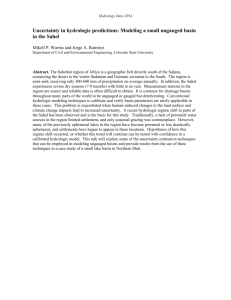“Performance`s being…
advertisement
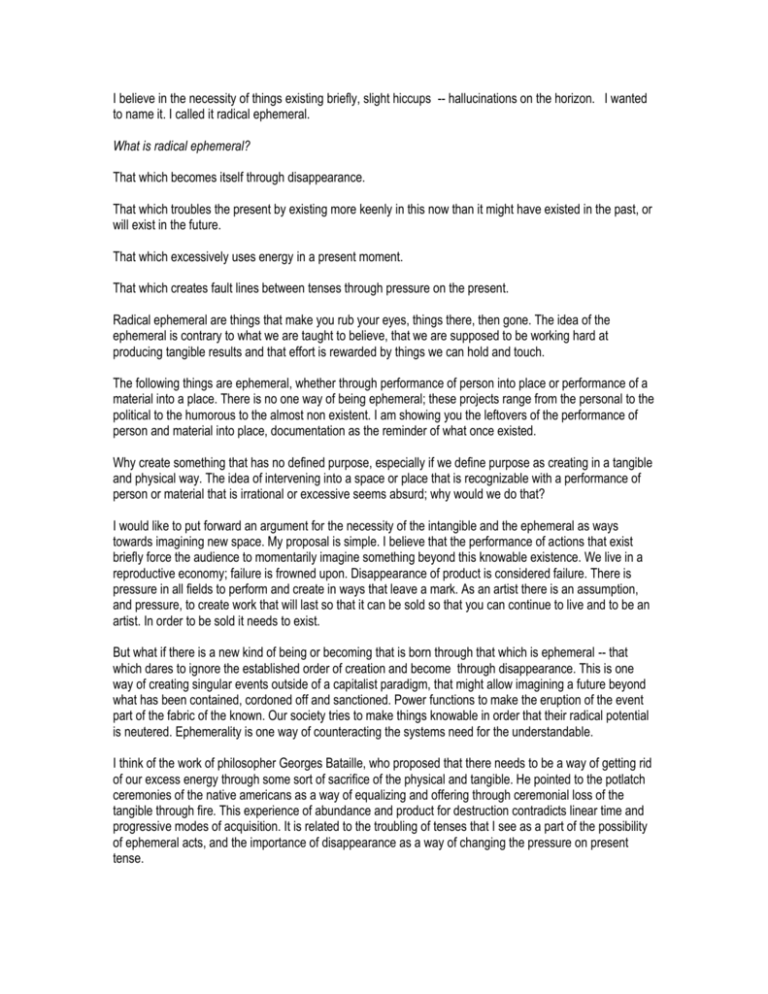
I believe in the necessity of things existing briefly, slight hiccups -- hallucinations on the horizon. I wanted to name it. I called it radical ephemeral. What is radical ephemeral? That which becomes itself through disappearance. That which troubles the present by existing more keenly in this now than it might have existed in the past, or will exist in the future. That which excessively uses energy in a present moment. That which creates fault lines between tenses through pressure on the present. Radical ephemeral are things that make you rub your eyes, things there, then gone. The idea of the ephemeral is contrary to what we are taught to believe, that we are supposed to be working hard at producing tangible results and that effort is rewarded by things we can hold and touch. The following things are ephemeral, whether through performance of person into place or performance of a material into a place. There is no one way of being ephemeral; these projects range from the personal to the political to the humorous to the almost non existent. I am showing you the leftovers of the performance of person and material into place, documentation as the reminder of what once existed. Why create something that has no defined purpose, especially if we define purpose as creating in a tangible and physical way. The idea of intervening into a space or place that is recognizable with a performance of person or material that is irrational or excessive seems absurd; why would we do that? I would like to put forward an argument for the necessity of the intangible and the ephemeral as ways towards imagining new space. My proposal is simple. I believe that the performance of actions that exist briefly force the audience to momentarily imagine something beyond this knowable existence. We live in a reproductive economy; failure is frowned upon. Disappearance of product is considered failure. There is pressure in all fields to perform and create in ways that leave a mark. As an artist there is an assumption, and pressure, to create work that will last so that it can be sold so that you can continue to live and to be an artist. In order to be sold it needs to exist. But what if there is a new kind of being or becoming that is born through that which is ephemeral -- that which dares to ignore the established order of creation and become through disappearance. This is one way of creating singular events outside of a capitalist paradigm, that might allow imagining a future beyond what has been contained, cordoned off and sanctioned. Power functions to make the eruption of the event part of the fabric of the known. Our society tries to make things knowable in order that their radical potential is neutered. Ephemerality is one way of counteracting the systems need for the understandable. I think of the work of philosopher Georges Bataille, who proposed that there needs to be a way of getting rid of our excess energy through some sort of sacrifice of the physical and tangible. He pointed to the potlatch ceremonies of the native americans as a way of equalizing and offering through ceremonial loss of the tangible through fire. This experience of abundance and product for destruction contradicts linear time and progressive modes of acquisition. It is related to the troubling of tenses that I see as a part of the possibility of ephemeral acts, and the importance of disappearance as a way of changing the pressure on present tense. These bends in the present tense make past and future more porous. I propose that the ephemeral acts as a way of leapfrogging out of the world as we know it. The ephemeral offers an exaggerated present, by outdoing and surpassing what we anticipate. I think of how we can experience pain, how in the moment of pain it is the part of the body that is in pain that exists more than the rest of the body. Afterwards you feel better, but that excessive moment in the present made you aware of a different intensity. Your excessive present punched a hole through tenses, and suddenly the future holds more room for possibility. My proposal is that ephemeral acts in art allow us to also imagine beyond the present in a way that is accentuated because they have been and now are gone. The pressure put on a space through the unexpected and excessive bends that space to allow something else in, it stretches time. The work of Dr. Martin Luther King imagined a new future, radically different from the present. He articulated this dream inside public space in words that existed and then disappeared. It was not a linear progression, it was a dream that was much larger than the reality of the present. The following is excerpted from MLK’s I have a dream speech, “We have also come to this hallowed spot to remind America of the fierce urgency of Now. This is no time to engage in the luxury of cooling off or to take the tranquilizing drug of gradualism. Now is the time to make real the promises of democracy. Now is the time to rise from the dark and desolate valley of segregation to the sunlit path of racial justice. Now is the time to lift our nation from the quicksands of racial injustice to the solid rock of brotherhood. Now is the time to make justice a reality for all of God's children.” My focus is on the articulation of the urgency of now, the jump over what is to what could be imagined. Suddenly a new point has been charted on a map because someone has dared to articulate or propose radical difference inside the present. This creates a present/ future collision. The act that has happened in the present tense does not make sense in the present, and before it can become assimilated into the present it disappears. The speech is over, the performance is finished or the materials disappear. The overage of expenditure in the now has exerted pressure and these tears in the tenses allow the viewer / listener to imagine a radically different future as they stand in the present. This new possibility now sits like a flag that waves over a sight heretofore unimagined. The beauty of ephemeral art is that although we can have documentation of events, allowing us to experience them past the event date, there is something unique about experiencing with our body a present moment that will soon not exist. I would propose that this experience gives a heightened perception of the present, and that in this heightened perception there exists a simultaneous possibility and unknowingness for future. Acts that disappear create new and radical potential because they refuse to conform to the linear arrow of time and physical existence. The ephemeral becomes through disappearing, its power is in the fact that it does not last, it refuses to be, except in this fierce now. In the context of this years MLK talk, and given the campus theme, I wanted to propose an act that was ephemeral and large, stretching a boundary of possibility. It is an act that exists temporally, with both links to advertising and a re-routing of how we view language in space. I chose the sky as location because it seems aspirational. To look up to the sky is to look towards something better than what exists here on earth, bound by gravity. We are a people of horizon gazers; to look up is to de-stabilize our way of thinking and seeing and, I would propose, automatically throws us outside of linear time. It is like an extra push from the present towards an imagining of future. Martin Luther King Day 2013, Denison University Sheilah Wilson Bataille, Georges, Visions of Excess, University of Minnesota Press: 1970. Grosz, Elizabeth, Becomings: Explorations in Time, Memory and Future , Cornell University Press: 1999. Phelan, Peggy, Unmarked: The Politics of Performance, Routledge: 1993.
